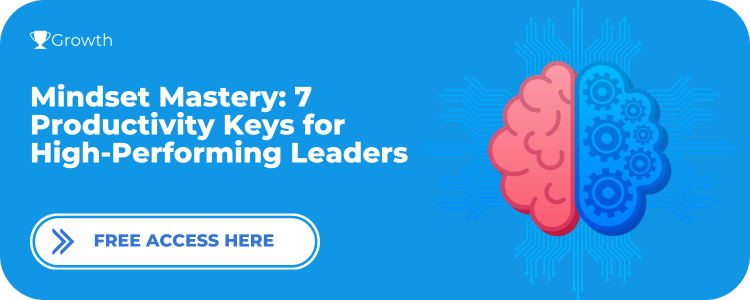
.
✅ FREE ACCESS: Mindset Mastery: 7 Productivity Keys For High-Performing Leaders
Podcast version
Ever felt like you’re running but getting nowhere? What if the very steps you’re taking forward are actually pulling you back?
And here’s a tough one: What if the sacrifices you’re making now are for a destination you might not even want to reach?
Mind-boggling, right? That’s why today, we’re going to learn 3 Personal Growth Mistakes you might be making and the actionable steps for proper course correction.
But before we get into it, make sure you grant your lifetime access to our free Workbook: Mindset Mastery: 7 Productivity Keys for High-Performing Leaders.
This is your chance to make the mindset shift you need to boost your personal growth by using the 7 mindset keys of the 1% top-performing leaders.
Navigating Personal Growth: Beyond Common Missteps
The realm of personal growth is vast and can often be misleading.
It’s easy to mistake motion for progress. Our era, one of fast change and digital feedback loops, only complicates our journey with an overload of information, advice, and peer pressure.
The bedrock of genuine progress, however, remains largely unchanged.
It’s not about chasing trends but understanding foundational truths about ourselves, our environment, and the interplay between the two.
With this in mind, we’re going to dive into 3 common mistakes that can bring your personal growth to a full stop and actionable steps for proper course correction.
These mistakes are:
- Falling into the Work-Over-Happiness Pitfall
- Trading Authentic Growth for Social Approval
- Not Seeking Feedback Consistently
By learning how to avoid these mistakes, you will build your foundation for authentic, fast, and lasting personal growth.
Falling into the Work-Over-Happiness Pitfall
The first of the 3 Personal Growth Mistakes You’re Probably Making is Falling into the Work-Over-Happiness Pitfall.
Many of us fall into the trap of believing that happiness is a destination.
We often say:
- “I’ll be happy when I get that promotion.”
- “I’ll be happy when I reach that salary.”
But Shawn Achor’s groundbreaking book, The Happiness Advantage flips this notion on its head.
He argues that:
“It’s not success that breeds happiness, but happiness that breeds success.”
Achor’s research found that our brains function better when they are positive, making us more creative, productive, and resilient.
But what fuels this positivity?
We tend to think that those are moments outside of work.
Why is that? Can’t we just love our work and be positive about it?
That’s a tough question that requires an extensive approach, but in summary, I would say:
By categorizing something as work, you are saying that you do that for compensation.
The fact that you need compensation is evidence that you wouldn’t be willing to do it otherwise.
So, when we say we love our work, it’s not exactly the work that we love.
It’s the relationships we cultivate, the sense of purpose in the mission, and the sense of belonging to a worthwhile cause.
We tend to think in those terms outside of what we categorize work, but it doesn’t have to be the case and, in my opinion, it shouldn’t be the case.
Okay, so here’s one way of putting this:
Happiness is not a destination, happiness is a row boat.
What does that mean?
It means that happiness is not where you should be. Happiness is the thing that will take you there, but you have to row.
Why does that matter?
If you think that happiness is somewhere you need to go, you will sacrifice everything around you to get there.
But if you realize that happiness is a vessel, your only chance to succeed is to use it to get to where you want.
So you don’t sacrifice what’s meaningful, you embrace it.
The Path to Balance
To make sure you’re using happiness as a vessel, you need 2 things:
- A value structure.
- A moment assessment.
Those together form a frame of reference to navigate through life rowing the happiness boat.
A value structure is a list of non-negotiables that will be your North Star, ranked from the most important to the least important.
Here is my value structure:
- Health
- Family
- Work
That means, my top priority is my personal health.
Without health, I can’t do the other 2 important things on my list of non-negotiables, which are taking care of my family and working productively.
However, depending on the moment assessment, this order might temporarily shift.
Maybe I need to work long hours right now to build something that my family and my health will benefit from in the mid to long term.
Maybe my family is going through some particular challenges that need my attention over everything else.
Once those particularities pass, I can go back to the initial order of my value structure and always be true to myself.
You see? When we have clarity, we can make informed decisions that keep us on track.
Build your value structure and assess the moment for every item on your list to always have clarity, boundaries, and success on your terms.
Trading Authentic Growth for Social Approval
The second of the 3 Personal Growth Mistakes You’re Probably Making is Trading Authentic Growth for Social Approval
We humans are social creatures.
That means we need to manage our lives in constant negotiation with the environment around us.
What we do affects our lives and the lives of others, at the same time, based on that negotiation.
That produces a dichotomy between our personality and our persona.
Personality is the unique set of behaviors, feelings, thoughts, and motives that characterize us as individuals.
Persona, in Jungian psychology, is the social mask we wear in public. It’s the role we play to fit into society.
That dichotomy sets the game of our personal growth. How?
Well, personal growth is not self-enhancement in a vacuum.
It’s more like becoming a more refined, adaptable version of ourselves in a context that’s meaningful to the world around us.
If we were to merely amplify our personalities, we might risk becoming out-of-sync with our environment.
On the flip side, if we were to allow our personas to direct our personal growth, we could become mere reflections of cultural expectations, completely absent of authenticity.
This interplay between personality and persona is how we should properly set our personal growth game.
Can your personality, made of your desires, passions, and tendencies find a voice and place in the world through a persona that’s adaptable and useful?
Can you be malleable to change without losing your essence? Can you let social norms guide you without overshadowing who you are?
The goal is not to let one lead at the expense of the other.
Instead, it’s about allowing your persona to pave the way based on social feedback, while your personality injects that path with meaning, passion, and authenticity.
Only by striking this balance, you can ensure that your growth is both personally fulfilling and externally relevant.
Not Seeking Feedback Consistently
The last of the 3 Personal Growth Mistakes You’re Probably Making is Not Seeking Feedback Consistently.
The key question is: Why Do we Shy Away From Feedback?
Well, Fear of Criticism is an obvious one. It’s not like we enjoy being told we’re wrong.
But there’s also our Pride and Ego, that’s the belief that we already know best, making feedback seem unnecessary.
And also, Bad Past Experiences. Poorly delivered feedback can leave scars, making us wary of seeking it in the future.
The Power of Feedback
But despite these challenges, the power of feedback is unparalleled:
Feedback provides insight into how others perceive you, which may differ from your self-image.
This realization alone can be a strong source of growth.
It’s true that feedback highlights gaps in knowledge and skills which might be uncomfortable.
But if you really want to boost your personal growth you have to introspect and adopt these 3 mantras:
- Comfort is a lie.
- You are more than what you like to hear.
- Becoming is better than being.
Now, write this down:
Feedback is a shortcut to enable these 3 axiomatic presuppositions in your life faster than anything else.
How to Receive Feedback
So, how to seek out feedback regularly?
Here are 3 practices you can incorporate into your life starting today:
1) Establish Regular Check-ins
Whether it’s with colleagues, friends, or mentors, set up routine times where you discuss performance, goals, and areas for improvement.
2) Invite Critique from people around you
Whenever you complete a task or project, actively ask those involved or affected:
- “What could I have done better?”
- “Do you have any suggestions for me?”
That will give you the opportunity to hear what people think but were not inclined to say.
3) Give Feedback to Understand and Empathize
By stepping into the shoes of a feedback-giver, you cultivate a deeper understanding and empathy towards those providing feedback to you.
It not only enriches your perspective on various topics, tactics, and approaches but also reinforces a culture of open communication.
And always remember: Feedback feeds back when it’s positive and specific.
In the Mindset Mastery Workbook, I present 7 mindset keys with science-backed and step-by-step processes based on neuroscience, evolutionary psychology, and even nutrition to set you on a course of sustainable personal growth. The link is in the description.




